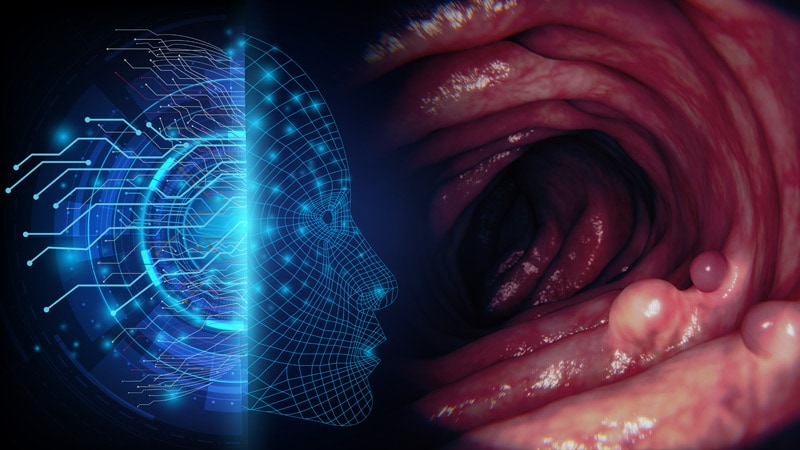Colonoscopy performed with an artificial intelligence (AI)–based computer-aided detection (CADe) system decreased the adenoma miss rate (AMR) by roughly half in comparison to standard colonoscopy without AI assistance in a randomized controlled trial.
“Such reduction is achieved by reducing the error in detecting subtle, small lesions that can be missed by the human eye,” lead investigator Cesare Hassan, MD, PhD, with the gastroenterology unit at Nuovo Regina Margherita Hospital in Rome, Italy, told Medscape Medical News.
The study was published online March 15 in Gastroenterology.
Tandem Colonoscopy Study
Investigators behind the study enrolled 230 adults undergoing colorectal cancer screening or surveillance at eight centers in Italy, the United Kingdom, and the United States.
All participants underwent two same-day, back-to-back colonoscopies with or without the GI-Genius (Medtronic) AI deep-learning CADe program in two different arms. In one arm, AI was followed by standard colonoscopy; in the other arm, standard colonoscopy was followed by AI.
The primary outcome of the study was AMR, defined as the number of histologically confirmed lesions detected during the second colonoscopy divided by the total number of lesions detected during both procedures.
Bowel preparation and quality of the examinations were similar for the study groups.
The AMR was significantly lower with AI-assisted colonoscopy first than non-AI first (15.5% vs 32.4%; adjusted odds ratio [OR], 0.38; 95% CI, 0.23 – 0.62). This was largely due to a decrease in the miss rate of flat and small lesions in the proximal and distal colon.
Among adenomas <10 mm, the AMR with AI first was 16.5%, compared with 33.8% with standard non-AI colonoscopy first (OR, 0.39; 95% CI, 0.25 – 0.61). The AMR was also significantly lower with AI first for adenomas ≤5 mm (15.9% vs 35.8%; OR, 0.34; 95% CI, 0.21 – 0.55). No differences in AMR were evident for adenomas measuring 6–9 mm or ≥10 mm.
With regard to morphology, the miss rate of non-polypoid lesions was significantly lower with AI first (16.8% vs 45.8%; OR, 0.24; 95% CI, 0.13 – 0.45), and there was a numerical decrease in the miss rate of polypoid lesions with AI that did not reach statistical significance.
The use of AI was also associated with a statistically significant reduction in the false negative rate (6.8% vs 29.6%; OR, 0.17; 95% CI, 0.05 – 0.67).
The authors say their findings offer indirect support to the higher adenoma detection rate demonstrated with this CADe system in two previous randomized controlled trials.
More High-Quality Evidence for AI-Assisted Colonoscopy
“This is a very well-executed study, and it does show a reduced miss rate with AI during colonoscopy,” Douglas Rex, MD, director of endoscopy at Indiana University Hospital in Indianapolis, told Medscape Medical News.
“AI seems destined to contribute importantly to colonoscopy,” added Rex, who was not involved in the study.
Atsushi Sakuraba, MD, PhD, gastroenterologist with the University of Chicago Medical Center, who also was not involved in the study, said he is not surprised by these latest findings on AI-assisted colonoscopy.
This study and others have provided “high-quality evidence that AI-aided colonoscopy increases the adenoma detection rate and decreases the adenoma miss rate, so I consider that it would soon become standard of care to use AI-aided colonoscopy in clinical practice,” Sakuraba told Medscape Medical News.
Rex noted that this specific AI program is a “detection program, so-called CADe, but there will be programs for the prediction of histology (CADx) and programs that assess how carefully the colon is being examined by the doctor. All of these show promise for reducing operator dependence, which is very problematic in colonoscopy.”
Rex emphasized that AI programs are “not a threat to endoscopists, as there is still an enormous skill set required to effectively examine the colon and clear it of neoplasia.”
He cautioned that currently, the cost of the CADe programs is significant but is likely to come down as more vendors get US Food and Drug Administration approval for their programs.
As previously reported by Medscape Medical News, Medtronic and the American Society for Gastrointestinal Endoscopy are working to provide 50 AI-assisted GI Genius CADe modules at no cost to endoscopy centers serving economically disadvantaged patients in the United States. To apply, visit the ASGE program website.
The study was funded by Cosmo Artificial Intelligence-AI, Ltd. Hassan has relationships with Medtronic and Fujfilm. Rex and Sakuraba have disclosed no relevant financial relationships.
Gastroenterology. Published online March 15, 2022.
For more news, follow Medscape on Facebook, Twitter, Instagram, and YouTube.
Source: Read Full Article
